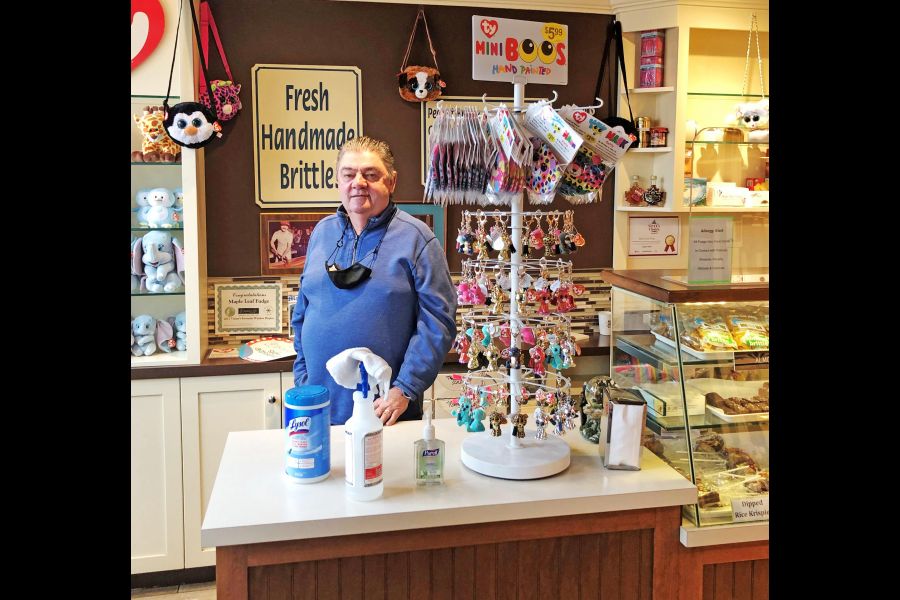Retailers are innovating and adapting as pandemic rolls on
A year into the COVID pandemic, some NOTL businesses are doing just fine, thank you, while others are just trying to hold on.
The businesses that rely primarily on town residents for their livelihood, like Hendriks’ Valu-mart in Old Town or Pet Valu in Virgil, are weathering the pandemic downturn well, if a little wounded.
Carol Thibault, owner of Pet Valu, puts it this way: “We’re doing OK. We’re fortunate because pets are family members. And they need to eat. People cherish their pets so they’re making sure they are being well cared for.
“There’s obviously been a disruption to our business as usual. But our community has been wonderful, supporting us and all the local businesses.”
Tony Hendriks, proprietor of Hendriks’ Valu-mart, says his business this year is just about the same as January last year.
“Obviously, we have zero tourism right now,” he says. “But we’re serving more locals who did not go away this winter. We actually have more customers.”
“They’re not shopping as regularly, trying to stay home more and shop less, but on balance we have the same number of customer visits in a week.”
Businesses relying on the town’s three million annual visitors are having a more complicated time successfully navigating the pandemic.
Take John Koldenhof, owner of Maple Leaf Fudge.
“We miss the buses,” Koldenhof says. “We miss the tourists. We miss the Shaw Festival.”
Koldenhof has been making fudge in Niagara-on-the-Lake for over 40 years and is proud of that longevity. He points to a black and white photograph of his father and Prince Philip hanging near the entrance to the store. It was 1967. “Prince Phillip is eating fudge and (now) he’s 99!
“I’ll get through it. Rent relief helped for five months and the employment subsidy has allowed me to bring back some staff.”
The store has a modestly growing online business and some curbside and local delivery sales.
“But I’m going through my own money. I’m 68. It’s hard. I’m burning my retirement.”
Irish Design, a Queen Street fixture for 34 years, sells authentically Irish clothing and more. Proprietors Maureen and Paul Dickson took the opportunity during the first lock down to upgrade their point-of-sale system and build a whole new website.
“The new website has been our saving grace,” says Paul Dickson. “Up to that point our online capacity didn’t really show sales results. Our online business has quadrupled.”
Dickson’s crystal ball says the local business world will start to open up again in March.
“We’re not quitting. We are a little more focused on the things we do right and the things that maybe we didn’t do right.”
Beau Chapeau Hat Shop opened its doors in 1997 and almost immediately became an early adopter of e-commerce.
The shop buys mostly from small businesses, so it has been difficult to balance the need to cut back orders and keep small suppliers healthy.
“We want to succeed along with our suppliers,” says owner Kevin Neufeld. “They don’t have a social safety net.”
Twenty-plus years of e-commerce has given Beau Chapeau a healthy subscriber database—almost 15,000 contacts. “That saved us — paid our rent.”
The company has managed to keep three employees the whole time.
“Our staff are overachieving, problem-solving, geniuses. We would not have survived without them. They are incredible.”
And Neufeld is no shrinking violet. This spring, the entrepreneur is physically expanding his business, taking over the former Kurtz Culinary Creations next door.
“We’re excited. We’re going to double our footprint by late spring.”
Niagara-on-the-Lake Chamber of Commerce president Eduardo Lafforgue said he believes only the return of the visitors will help the local business community truly emerge from the depths.
And it may take a long time.
“If we open (the border) in April this year, which may or may not happen, the latest data suggests we won’t return to 2019 levels of business until 2025,” Lafforgue says.
“Let’s face it, 18,000 residents just can’t take the place of three million visitors.”
According to Lafforgue, one bit of optimism is the nature of the town’s tourism business.
“Our tourists generally come from shorter distances. We are poised to recover earlier than long haul destinations particularly that depend on international travel.”
He has another optimistic note. Although some businesses are closing, he’s aware of at least three of his member businesses that are growing or opening new outlets in town.
One of those is Budapest Bakeshop.
Anett and Todd Kane opened their shop in 2019, not a year before the pandemic closed everyone’s doors. Originally from Buffalo, the couple and their two kids sold everything to open the business selling specialty Hungarian chimney cakes from Anett’s old family recipes.
After less than two years, they see so much in Niagara’s future they are moving to larger, more efficient space, in the former Starbucks on Queen Street.
“We’ve been very lucky,” says Todd Kane. “In our first year we saw the strength of the tourist business. Then, with COVID, we were able to really get out to the locals all around the region.”
“We offer something that is completely different. Once word started to get out the locals just started to come. They came when the tourists weren’t here,” he says.
“Right now, we’re in the store with a four-year-old and an eight-year-old doing online school, packing up for the move. We are really excited.”
It’s Paul Dickson of Irish Design who paints perhaps the most optimistic picture: “Retail in Niagara-on-the-Lake, based on what we have here — the history, the theatre, the wineries and hotels — will bounce back. We’re a great little community.”










